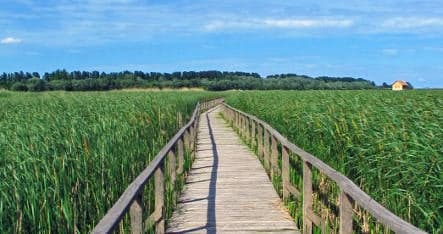Study touts reed as new sustainable fuel source

Wetland reeds, traditionally used for instruments, thatched roofs, paper and boats, may have a new use. A new German study reported this week that the plant could be used to fuel local power plants across much of the country.
According to a new study from the University of Greifswald, a two-year project showed that the wetland growth is fit to power smaller, decentralised power stations in parts of Germany that can sustain wetland growth.
A research team from the Institute for Sustainable Development of the Earth (DUENE) tested reed crops harvested in northeastern German wetlands near Neukalen. In a test field of more than two hectares (about 6 football fields), DUENE director Wendelin Wichtmann and his team surveyed a variety of planting and harvesting methods. Three planting seasons produced an initial reed crop yield, and the team predicts that after two to five more years, harvests could be used to regularly supply smaller heat and power stations.
Wichtmann told The Local that reed was a realistic energy option for the future. The grass could be used as a supplemental and independent fuel in “nearly half of the states across Germany,” both in the northern and southern parts of the country, including wetland areas around Bremen, Hamburg and Brandenburg he said.
The reed, ground into pellets for transport, could support small power stations within a 30-kilometre radius that put out between 15 and 1,000 kilowatts, or to power large agricultural operations with high heat consumption, such as pig breeding farms or aquacultures.
The study also found that horticultural companies, smaller businesses and 30-home residential areas could also benefit from reed energy.
Wichtmann said he hopes to boost reed planting throughout areas in northern Germany in particular, where 50,000 hectares in Mecklenburg Western-Pomerania could be used to harvest the renewable resource.
Reed technology is not only cleaner, Wichtmann said, but it also has a lower emission profile than straw, which gives off more chloride and sulphates. Tests at a block-unit heat and power station in Friedland, in which the plant was mixed with various combinations of wood, underscored reed’s positive energy profile, he added.
The plant technology could also create future jobs. “That’s an important aspect, next to the ecological aspect,” Wichtmann told The Local. Work prospects involving reed energy could include pre-processing, harvesting, storing, compacting and packaging the grass, he noted.
Comments
See Also
According to a new study from the University of Greifswald, a two-year project showed that the wetland growth is fit to power smaller, decentralised power stations in parts of Germany that can sustain wetland growth.
A research team from the Institute for Sustainable Development of the Earth (DUENE) tested reed crops harvested in northeastern German wetlands near Neukalen. In a test field of more than two hectares (about 6 football fields), DUENE director Wendelin Wichtmann and his team surveyed a variety of planting and harvesting methods. Three planting seasons produced an initial reed crop yield, and the team predicts that after two to five more years, harvests could be used to regularly supply smaller heat and power stations.
Wichtmann told The Local that reed was a realistic energy option for the future. The grass could be used as a supplemental and independent fuel in “nearly half of the states across Germany,” both in the northern and southern parts of the country, including wetland areas around Bremen, Hamburg and Brandenburg he said.
The reed, ground into pellets for transport, could support small power stations within a 30-kilometre radius that put out between 15 and 1,000 kilowatts, or to power large agricultural operations with high heat consumption, such as pig breeding farms or aquacultures.
The study also found that horticultural companies, smaller businesses and 30-home residential areas could also benefit from reed energy.
Wichtmann said he hopes to boost reed planting throughout areas in northern Germany in particular, where 50,000 hectares in Mecklenburg Western-Pomerania could be used to harvest the renewable resource.
Reed technology is not only cleaner, Wichtmann said, but it also has a lower emission profile than straw, which gives off more chloride and sulphates. Tests at a block-unit heat and power station in Friedland, in which the plant was mixed with various combinations of wood, underscored reed’s positive energy profile, he added.
The plant technology could also create future jobs. “That’s an important aspect, next to the ecological aspect,” Wichtmann told The Local. Work prospects involving reed energy could include pre-processing, harvesting, storing, compacting and packaging the grass, he noted.
Join the conversation in our comments section below. Share your own views and experience and if you have a question or suggestion for our journalists then email us at [email protected].
Please keep comments civil, constructive and on topic – and make sure to read our terms of use before getting involved.
Please log in here to leave a comment.